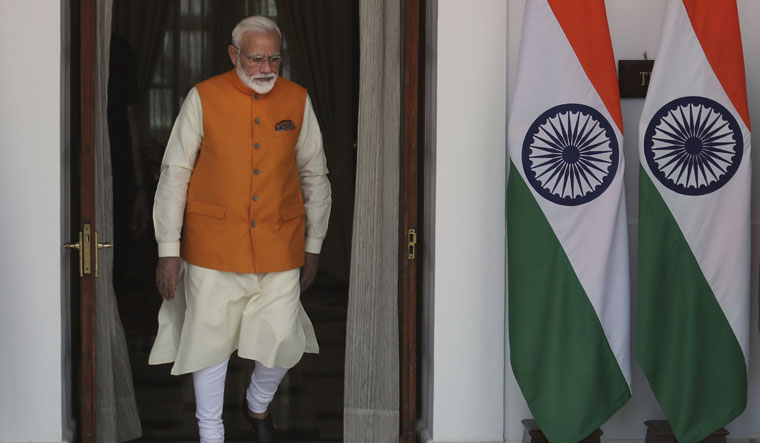Hours ahead of the maiden PM Narendra Modi-led cabinet meeting, the government announced the portfolios of the ministers who took oath on Thursday. Key changes were made in the all-powerful Cabinet Committee on Security, which comprises ministers of home, defence, external affairs and finance.
ALSO READ
- Tripura CM Manik Saha unveils Bangla book of PM Narendra Modi's speeches
- SC stays proceedings of defamation case against Rahul Gandhi in Jharkhand court
- ‘What has Kejriwal done in 10 years?’: Amit Shah attacks AAP in address to Delhi’s slum dwellers
- Modi inaugurates Namo Bharat RRTS: Here's how fast you can travel from Delhi to Meerut on new corridor
- Watch Diljit Dosanjh meet PM Narendra Modi in ‘unexpected collab’ of 2025: Photos and Video
- Congress to begin campaign seeking Amit Shah’s resignation after Jan 3
- India, Kuwait ink key defence pact as PM Modi concludes two-day visit
A big change happened in the case of Rajnath Singh, who has been moved from the North Block to the South Block. In his place, Amit Shah will be the new home minister. Interestingly, when Narendra Modi was the Gujarat chief minister, Shah held the home portfolio. With home ministry going to Shah, the internal security policy is also likely to see a shift—from Rajnath Singh's Vajpayee-style of conciliatory engagement to an aggressive, hawkish stance. Shah, in his political campaign, had insisted on a muscular approach against terrorists in Kashmir, Naxal-affected areas and others. He had also promised to throw out all infiltrators including illegal Bangladeshis out of the country.
Shah, who is also the BJP chief, will be assisted by two BJP state presidents. G. Kishan Reddy, the former Telangana party chief, and Nityanand Rai, the current Bihar president, both ministers of state. The ministry of home affairs handles the Intelligence Bureau, central armed police forces like the CRPF, BSP, CISF, ITBP and the SSB. The ministry is also the cadre-controlling authority for the IPS and IAS officers, apart from administrative control over the National Investigation Agency.
After Shah, Modi reposed faith in Nirmala Sitharaman to be the finance minister, also handling corporate affairs. Her handling of the Rafale crisis as she defended the deal inside and outside the Parliament had come in for praise from senior party leadership. She will be assisted by Anurag Thakur, who has been made the minister of state. Modi government's budget, likely to presented in July, will be their first big responsibility.
Former foreign secretary S. Jaishankar will head the prestigious external affairs ministry. This makes him eligible for the high table—the Cabinet Committee on Security. Choosing a specialist to handle the foreign affairs department shows that the prime minister is keen on giving new direction to country's foreign outreach. Modi would like to see his stature enhanced globally.
Jaishankar will be assisted by V. Muraleedharan, the former Kerala party head. The latter will also be the parliamentary affairs minister of state. Shripad Yesso Naik is the minister of state for defence, along with the ministry of Ayurveda, Yoga and Naturopathy, Unani, Siddha and Homoeopathy (AYUSH). Kiren Rijiju is now the new sports minister.
Ramesh Pokhriyal is the new HRD minister. His choice is seen as an effort to bring forth a new education policy, reflecting inputs from the RSS. Prakash Javadekar will be the new information and broadcasting minister, along with the portfolio of environment. Ravi Shankar Prasad, Harsimrat Badal, Ram Vilas Paswan, Dharmendra Pradhan, Piyush Goyal and Mukhtar Abbas Naqvi have retained their old portfolios.
Another big change has been in the ministry names. The ministries of water resources, river development and ganga rejuvenation has been merged into a new ministry named Jal Shakti. Jodhpur MP Gajendra Singh Shekhawat has been made the minister in-charge. The BJP had promised to carve out a new ministry for water.



